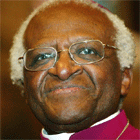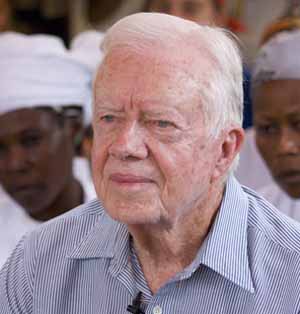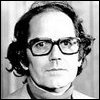FOR IMMEDIATE RELEASE
AHRC-FST-032-2008
May 20, 2008
[A Statement from the NGO Coalition for an Effective Human Rights Council
forwarded by the Asian Human Rights Commission
SRI LANKA: UN: Vote Sri Lanka off Human Rights Council. NGO Coalition for an
Effective Human Rights Council - www.hrw.org/effectiveHRC/SriLanka]
For Immediate Release
Three Nobel Peace Laureates Oppose Colombo’s Bid for Re-election
   (New York, May 19, 2008) – Winners of the Nobel Peace Prize from three
continents called on UN members to reject Sri Lanka’s candidacy for
the UN Human Rights Council, the NGO Coalition for an Effective Human Rights
Council said today. Nobel laureates Desmond Tutu of South
Africa, Adolfo Pérez Esquivel of Argentina, and Jimmy Carter of the United
States each published statements urging opposition to Sri Lanka
because of its abusive human rights record.
Elections to the 47-member council, the United Nations’ leading human rights
body, will be held in New York on May 21, 2008. Six candidates
– Bahrain, Japan, Pakistan, South Korea, Sri Lanka, and Timor Leste – are
running for four seats allocated to Asian states. Council members
are required to “uphold the highest standards” of human rights and “fully
cooperate” with the council. (New York, May 19, 2008) – Winners of the Nobel Peace Prize from three
continents called on UN members to reject Sri Lanka’s candidacy for
the UN Human Rights Council, the NGO Coalition for an Effective Human Rights
Council said today. Nobel laureates Desmond Tutu of South
Africa, Adolfo Pérez Esquivel of Argentina, and Jimmy Carter of the United
States each published statements urging opposition to Sri Lanka
because of its abusive human rights record.
Elections to the 47-member council, the United Nations’ leading human rights
body, will be held in New York on May 21, 2008. Six candidates
– Bahrain, Japan, Pakistan, South Korea, Sri Lanka, and Timor Leste – are
running for four seats allocated to Asian states. Council members
are required to “uphold the highest standards” of human rights and “fully
cooperate” with the council.
In a commentary published by The Guardian in London right_to_be_there.html),
Archbishop Desmond Tutu of South Africa charged that “the systematic abuses by
Sri Lankan government forces are among the most serious
imaginable,” citing widespread torture and extrajudicial killings.
“Governments owe it to Sri Lankan human rights victims – and to victims of
human rights abuses around the world – to ensure that the Sri Lankan bid
fails,” Tutu declared. Tutu won the Nobel Peace Prize in 1984 for
his leadership of the campaign to end apartheid in South Africa.
In a commentary published by Página 12 in Buenos Aires
(http://www.pagina12.com.ar/diario/elmundo/4-104335-2008-05-17.html), Adolfo
Pérez
Esquivel compared the routine torture and the hundreds of “disappearances” and
extrajudicial killings committed by Sri Lankan government forces
to the “dirty wars” waged by various Latin American governments against their
own citizens in the 1970s and 1980s. “As Latin Americans know
all too well, there are few crimes more horrible for a government to commit
than summarily removing its own citizens from their homes and
families, often late at night, never to be heard from again,” declared
Esquivel. “Latin American governments can do a great service to the
people of Sri Lanka by rejecting their government’s candidacy for the Human
Rights Council.” Esquivel won the Nobel Peace Prize in 1980 for
his opposition to the “disappearances,” extrajudicial killings, and torture
used by the military government of Argentina in combating domestic
terrorists.
Former US President Jimmy Carter observed that the UN established membership
standards for the Human Rights Council in 2006 so that it
would be “led by countries with a greater commitment to human rights.” A
statement
released by the Carter Center in Atlanta “calls on the General Assembly
not to re-elect Sri Lanka to the Human Rights Council,” citing “the country’s
deteriorating human rights record since its first election to the
Council in 2006.” Carter won the Nobel Peace Prize in 2002 for his work to
resolve international conflicts, advance democracy and human
rights, and promote economic and social development.
The Nobel laureates added their voices to the Sri Lankan and international
campaigns against the re-election of Sri Lanka to the council.
Human rights organizations within Sri Lanka urged UN members to “hold the Sri
Lankan government accountable for the grave state of human
rights abuse in the country” by rejecting its candidacy, observing it “has
used its membership of the Human Rights Council to protect itself from
scrutiny.”
A coalition of more than 20 nongovernmental organizations from all regions of
the world wrote to UN members to oppose Sri Lanka’s re-
election to the council, citing its government for a wide range of serious
abuses, including hundreds of extrajudicial killings and enforced
disappearances, widespread torture, and arbitrary detention. The website
established by the NGO Coalition for an Effective Human Rights Council
detailed how Sri Lanka rejects the recommendations of UN human rights experts,
harshly attacks senior UN officials who report on human rights
issues, and has refused to engage in serious discussions to allow
international human rights monitoring.
The coalition noted in its letter that the armed separatist Liberation Tigers
of Tamil Eelam have long been implicated in serious human rights
abuses, but says this provides no justification for government abuses. The
abuses in Argentina opposed by Esquivel were committed by that
government in the name of combating extreme domestic terrorist organizations.
In 2007, a coalition of NGOs successfully opposed the candidacy of Belarus for
the Human Rights Council.
“Cheers went up amongst human rights defenders around the world when Belarus
was defeated,” said Hassan Shire Sheikh of the East and
Horn of Africa Human Rights Defenders Project in Uganda. “This year’s election
provides an opportunity for African states to send a strong
signal, following up on the defeat of Belarus. The Human Rights Council must
stand with the victims, not become an abusers’ club.”
To read the letter from the NGO coalition to the UN Human Rights Council,
opposing Sri Lanka’s candidacy, please visit:
http://www.hrw.org/effectiveHRC/SriLanka/INGOletter.html
To read more about the Sri Lanka campaign, please visit:
http://www.hrw.org/effectiveHRC/SriLanka
For more information, please contact:
In New York, for Human Rights Watch, Steve Crawshaw (English, French, German,
Russian): +1-212-216-1217; or +1-646-596-3348 (mobile)
In Geneva, for Human Rights Watch, Juliette De Rivero (English, French,
Spanish): +41-22-738-0481; or +41-79-640-1649 (mobile)
In Hong Kong, for Asian Human Rights Commission, Mike Anthony: +852-2698-6339
In Lima, for the Andean Commission of Jurists, Salvador Herencia:
+51-1-440-7907
In Kampala, for the East and Horn of Africa Human Rights Defenders Project,
Laetitia Bader: +256-775-141756
In Washington, DC, for Democracy Coalition Project, Dokhi Fassihian:
+1-202-721-5651; or +1-703-864-5550 (mobile)
# # #
About AHRC: The Asian Human Rights Commission is a regional non-governmental
organisation monitoring and lobbying human rights issues in
Asia. The Hong Kong-based group was founded in 1984. The above statement has
only been forwarded by the AHRC. Posted on 2008-05-20
***************************
Statement From The Carter Center on Upcoming
U.N. Human Rights Council Elections
16 May 2008
FOR IMMEDIATE RELEASE
The Carter Center calls on the General Assembly not to re-elect Sri Lanka to
the Human Rights Council in the upcoming Council elections.
Recently adopted reforms of the former Commission on Human Rights, including
competitive elections, call for the conduct of a government to
be a factor in whether it is selected for a seat on the Council.
 In a March 5, 2006, New York Times opinion piece on the establishment of the
Council, five Nobel Laureates, including former U.S. President
Jimmy Carter, wrote, "With these new procedures and the articulation for the
first time of standards for membership, we believe the new body
will be led by countries with a greater commitment to human rights." The
expectation was that governments submitting their candidacies would
be judged on their performance on human rights issues as a test of willingness
to tackle tough problems and to assess honestly human rights
violations wherever they occur. In a March 5, 2006, New York Times opinion piece on the establishment of the
Council, five Nobel Laureates, including former U.S. President
Jimmy Carter, wrote, "With these new procedures and the articulation for the
first time of standards for membership, we believe the new body
will be led by countries with a greater commitment to human rights." The
expectation was that governments submitting their candidacies would
be judged on their performance on human rights issues as a test of willingness
to tackle tough problems and to assess honestly human rights
violations wherever they occur.
Political resolve to abide by the new provision will be tested in the coming
round of election to the Council's membership. Will candidates be
judged by their peers on the basis of their commitments to improve human
rights conditions in their countries? There must be no return to the
old habit whereby regional blocs would offer uncontested slates for election,
during which the merits of any country's particular qualifications for
membership were never questioned.
Six countries -- Bahrain, Japan, Pakistan, South Korea, Sri Lanka, and Timor
Leste – are competing for four open seats in the Asian Group of
U.N. member states. The Carter Center urges delegations to support the
candidacies of Bahrain, Japan, Pakistan, South Korea, and Timor
Leste because these governments have demonstrated a greater commitment than
has Sri Lanka to the advancement of human rights. However,
numerous nongovernmental groups have raised concerns about Sri-Lanka's
candidacy due to the country's deteriorating human rights record
since its first election to the Council in 2006. For example, Sri Lanka has
one of the highest rates of enforced disappearances in the world,
with little or no discernable commitment to accountability.
To re-elect states with deteriorating human rights records would undermine the
Council at a time when it should be taking steps to shore its
credibility as the principle platform for addressing human rights violations.
It is our hope that by electing states that demonstrate through their actions
a commitment to furthering human rights, the Council will become a
more courageous and united voice on behalf of victims of human rights
violations.
http://www.cartercenter.org/homepage.html
*************************
"No right to be there! With a terrible record of torture and disappearance,
Sri Lanka doesn't deserve a seat on the UN human rights council. It should be
voted out" -Desmond Tutu
 It would seem self-evident that a country which tortures and kidnaps its own
people has no place on the world's leading human rights body.
Apparently not: Sri Lanka, despite repeated criticism for its human rights
record, is running for re-election to the UN human rights council, with
a vote to be held in New York on May 21.
Governments owe it to Sri Lankan human rights victims - and to victims of
human rights abuses around the world - to ensure that the Sri
Lankan bid fails. This will be an important test of the 47-member council, to
show that the UN's standards for it will be honoured. It would seem self-evident that a country which tortures and kidnaps its own
people has no place on the world's leading human rights body.
Apparently not: Sri Lanka, despite repeated criticism for its human rights
record, is running for re-election to the UN human rights council, with
a vote to be held in New York on May 21.
Governments owe it to Sri Lankan human rights victims - and to victims of
human rights abuses around the world - to ensure that the Sri
Lankan bid fails. This will be an important test of the 47-member council, to
show that the UN's standards for it will be honoured.
If Sri Lanka is defeated this year, that will be important not just for the
Sri Lankan human rights leaders who, at great personal risk, have
called for Sri Lanka's defeat, and for Sri Lankan civil society. In
combination with the humiliating defeat last year of Belarus, it will send an
important signal for the future: governments with track records of serious
human rights abuses do not belong on a body set up to protect the
victims of such abuses.
Sri Lanka has failed to honour its pledges of upholding human rights standards
and cooperating with the UN since joining the council two years
ago. Indeed, its human rights record has worsened during that time. The Sri
Lankan idea of cooperation with the UN, meanwhile, has been to
condemn senior UN officials (including the high commissioner for human rights,
Louise Arbour, and the under secretary general for humanitarian
affairs, John Holmes) as "terrorists" or "terrorist sympathisers."
The systematic abuses by Sri Lankan government forces are among the most
serious imaginable. Government security forces summarily remove
their own citizens from their homes and families in the middle of the night,
never to be heard from again. Torture and extrajudicial killings are
widespread. When the human rights council was established, UN members required
that states elected must themselves "uphold the highest
standards" of human rights. On that count, Sri Lanka is clearly disqualified.
The separatist Tamil Tigers have used despicable tactics in their war against
the government, including frequent suicide bombings. But that can
in no way excuse the scale of government abuses.
Fortunately, the news from the council is not all bad. Countries running from
other regions of the world have credible claims to be leaders in
promoting human rights. Argentina and Chile, which suffered terribly from
torture, enforced disappearances and extrajudicial killings in the past,
have become leading supporters of human rights, and now seek to join the
council. On the African slate, there are some true human rights
leaders, and - thankfully - no candidacy from Zimbabwe or Sudan. In the entire
world, Sri Lanka stands out as the most clearly unqualified
state seeking election to the council this year, and the place where things
are getting unambiguously worse.
Defeating the Sri Lankan candidacy would be a comfort to the people of Sri
Lanka. It would place international pressure on the government to
respect human rights, and to accept a UN human rights monitoring mission,
which it has stubbornly refused. It would help make the council a
place where true human rights leaders in all regions can help lead the world
towards greater respect for human life and human dignity. An
outcome, in short, that would benefit those who care about human rights in the
world. Any other result would be a travesty
Courtesy:
http://commentisfree.guardian.co.uk/desmond_tutu/2008/05/no_right_to_be_there.html |

